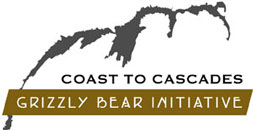First Nations Support For Grizzly Bear Recovery
Okanagan Nation Alliance
From ONA Tribal Council Resolution:
The Okanagan Nation Alliance (ONA) Chiefs Executive Council has declared Grizzly Bear, known as kiʔlawnaʔ in the nsyilxcen language, as At-Risk and in need of protection.
The Syilx (Okanagan) territory was once home to thriving populations of grizzly bears but today few remain. Without prompt recovery efforts, three remnant grizzly populations, the North Cascades, the Kettle-Granby, and the South Selkirks will soon disappear. It is critical that we ensure that kiʔlawnaʔ is protected and recovered in ways consistent with our culture, traditional knowledge, values, laws and customs.
St'at'imc Chiefs Council
Fom the SGS Environment Program:
The First Nations in southwest British Columbia are the original inhabitants of this land and we have never ceded our Title and Rights. Moreover, our Nations embrace our responsibility for the sustainability of this land.
[...]
The St’át’imc Nation has been involved in Grizzly bear research and recovery efforts since 1999. In 2011, the St’át’imc Chiefs Council (SCC) passed a Resolution for Grizzly bear recovery to focus their ongoing efforts to protect the Grizzly bear and to recognize it as an umbrella species for their culture. The SCC supports the Coast to Cascades Grizzly Bear Initiative, and calls on all its neighbouring Nations to join in the effort to sustain Grizzly bears.
Squamish Nation
In April 2015 the Squamish Nation added their voice to calls to safeguard Stl'lhalem (grizzly bear) on their territory.
The resolution recognises that: 'supportive relationship with other Nations, Governments, and organisations are needed to ensure that Stl'lhalem - grizzly bear will remain, occupy and thrive in it's traditional areas for all time'. This commitment to working with others is consistent with the sentiment of neighbouring Nations who have already declared similar resolutions in support of grizzly bear recovery, the Sta'at'imc Nation and the Okanagan Nation Alliance.
"Stl'lhalem (grizzly bear) has been an integral and critical part of Squamish Nation culture since time immemorial - its presence in Squamish Nation territory is an indicator of the health of the Squamish Nation land and people".
Regional & Local Support For Grizzly Bear Recovery
Local Government:
Squamish Lillooet Regional District
2015, Aug. 12th - Squamish Lillooet Regional District (SLRD) council votes to adopt resolution in support of grizzly bear recovery.
See Full SLRD Resolution Here.
COASTtoCASCADES presentation made on March 17th, 2014.
"...SLRD supports the management, recovery and long-term viability of grizzly bear populations in the SLRD region, encourages the creation and implementation of grizzly bear recovery plans for threatened grizzly bear populations as soon as possible, and encourages grizzly bear recovery planning to be integrated into parks planning processes."
Resort Municipality of Whistler
2014, Sept. 2nd - Resort Municipality of Whistler (RMOW) council votes to adopt resolution in support of grizzly bear recovery.
See Full RMOW Resolution Here.
COASTtoCASCADES presentation made on September 2nd, 2014.
"...the community of Whistler continues to support the management, recovery and long-term viability (of) grizzly bear populations in the Sea to Sky region and encourages the creation and implementation of Grizzly Bear Recovery Plans as soon as possible."
District of Lillooet
2014, Nov. 3rd - District of Lillooet (DoL) council votes to adopt resolution to support grizzly bear recovery.
See Full DoL Resolution Here.
COASTtoCASCADES presentation made on October 6th, 2014.
"...grizzly bears and the wild places they inhabit are an iconic and integral part of the Lillooet region's natural heritage and image, are culturally significant to First Nations, and there are ecological, economic, and spiritual benefits to conserving and recovering grizzly bears".
Village of Pemberton
2015, Apr. 7th - Village of Pemberton (VoP) council votes to adopt resolution in support of grizzly bear recovery.
See Full VoP Resolution Here.
COASTtoCASCADES presentation made on March 17th, 2014.
"...Pemberton was involved in and supported the April 2008 Sea-to-Sky LRMP which set a goal of achieving and maintaining Viable status for each of the four Grizzly Bear Population Units that overlap the Sea-toSky LRMP area through the development of Grizzly Bear Recovery Plans; these Grizzly Bear Recovery Plans have not been written and Grizzly Bear Population Units in the Sea to Sky Region remain Threatened".
District of Squamish
2015, Sep. 1st - District of Squamish council votes to adopt resolution in support of grizzly bear recovery.
See Full DoS Resolution Here.
COASTtoCASCADES presentation made on July 28th, 2015.
"...there are ecological, economic, and spiritual benefits to conserving and recovering grizzly bears including that they are an “umbrella species”, the conservation of which will benefit many other plants, animals and ecosystem values like clean water and recreational opportunities".
Regional Organisations:
BC Wildlife Federation
2015, Jan. 12th - BC Wildlife Federation issues support for COASTtoCASCADES and efforts towards grizzly bear recovery.
See BC Wildlife Federation Letter of Support.
"A return to a healthy population of Grizzly Bears will also be a strong measure to indicate the health of that particular ecosystem."
Local Organisations:
Pemberton Farmers Institute
2014, Jun. 30th - Pemberton Farmers Institute (PFI) issues support for COASTtoCASCADES and efforts towards grizzly bear recovery.
See Pemberton Farmers Institute Letter of Support.
"We depend on a rich, diverse ecosystem to keep our air and water clean, and enrich our soil. A healthy grizzly bear population is an excellent indicator of the strength of the Pemberton environment."










